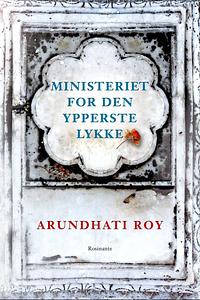You need to sign in or sign up before continuing.
Take a photo of a barcode or cover
Rushdie-esque novel spanning generations and historical events; vivid descriptions, memorable characters, searingly tragic (yet ultimately hopeful) plot
This is another beautifully written novel based on the overlapping lives that show the enormousness of life in India. Given the high bar set by Roy and others on this genre, this one came up a little short. The first 20 percent or so seemed essentially like a diversion from the real story, which didn't come until the second set of characters were introduced, and then only after a long, cynical set piece about Indian politics. There's a great, sad story about the impact the war in Kashmir had on a handful of participants but it is muddied somewhat by the full product.
arundhati roy is a mind-blower. this book is kind of about everything. this book is kind of everything.
Some thoughts halfway:
Not for people who like carefully plotted, well executed novels (keyword: plot).
But if you, like me, appreciates a beautiful mess, then you’ll probably like this one.
Ponderous. Polemical. Not very subtle. But still.
There’s a review in The Atlantic that referenced Galeano and Berger. I can see that.
“The pamphleteer subsumed the novelist” (Great review btw).
Not for people who like carefully plotted, well executed novels (keyword: plot).
But if you, like me, appreciates a beautiful mess, then you’ll probably like this one.
Ponderous. Polemical. Not very subtle. But still.
There’s a review in The Atlantic that referenced Galeano and Berger. I can see that.
“The pamphleteer subsumed the novelist” (Great review btw).
I'm generally a fairly quick reader, but after three days of reading and only getting up to 29%, I'm finally going to throw in the towel. Too many characters to keep track of, convoluted story, and it was too disjointed. Chosen as a book club book that I'm not going to attend any more. I think it would be helpful to have context into the politics discussed in this book - I admittedly am ignorant of them and attribute this to part of the reason that I had such a difficult time.
Didn't finish - the audiobook was pleasant to listen to, but the story became to meandering & difficult to follow for me.
This is a hauntingly, achingly beautiful story with a complicated narrative. I was prompted to read more about India's history, particularly Kashmir in the 90s, when I was a young American mother who never heard about the struggles there. I was not prepared for the shared feelings of grief during certain passages, but mostly at the end of the book when the timelines are woven together to complete the story. This book will stay with me for quite a while.
This is a hard book to review. The scope of this novel is huge, from its cast of characters to its ambitious backdrop of India from the 80s until the present. I think what Arundhati Roy does well is interlinking everything. I said this when I read [b:The God of Small Things|9777|The God of Small Things|Arundhati Roy|https://images.gr-assets.com/books/1436217001s/9777.jpg|810135] and I feel the same about this book - I think this will be better upon rereading.
There is a lot happening in this book. There are a lot of characters and there's a lot of history and cultures in this. I think this would be much more significant and enjoyable for someone who knows this history and these cultures. I learned a lot and I've noted a lot of things to do a bit of research on. I would like to revisit this book at some point because I genuinely believe that now I've read it, and with a little bit more knowledge on the events, I'll be able to understand so much more and I'll be able to pick up lots of little things that I couldn't this time around in my ignorance.
This novel is ambitious and it is beautifully written, but I think it just misses the mark for me. At least on my first reading of it.
There is a lot happening in this book. There are a lot of characters and there's a lot of history and cultures in this. I think this would be much more significant and enjoyable for someone who knows this history and these cultures. I learned a lot and I've noted a lot of things to do a bit of research on. I would like to revisit this book at some point because I genuinely believe that now I've read it, and with a little bit more knowledge on the events, I'll be able to understand so much more and I'll be able to pick up lots of little things that I couldn't this time around in my ignorance.
This novel is ambitious and it is beautifully written, but I think it just misses the mark for me. At least on my first reading of it.




